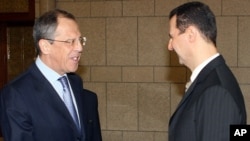As Syria takes criticism from almost all quarters, one nation - Russia - stands virtually alone in defending the government of President Bashar al-Assad.
While Arab League ministers discussed future steps on Syria, where 5,400 people have died in anti-government violence, Russian Foreign Minister Sergei Lavrov issued a warning: no sanctions and no foreign troops. Lavrov says that for Russia, the red line is fairly clearly drawn. He says Moscow will not support any sanctions.
At the same press conference, the foreign minister said Russia would use its United Nations Security Council veto to deny a U.N. mandate for the use of foreign troops in Syria
.
At the U.N. and in Moscow, Russian diplomats place violence by Syria’s largely civilian opposition on an equal level with violence by Syria’s army and police.
Lavrov says Western governments are one-sided because they ignore violence by Syria’s opponents.
But some say Russia sides with Syria’s government. Last week, Russia's only aircraft carrier, the Admiral Kuznetsov, and an eight-ship battle group dropped anchor at Moscow's naval base in Tarsus, Syria. Two days later, a freighter from St. Petersburg reportedly delivered 60 tons of Russian ammunition and weapons to a Syrian port.
Carnegie Moscow Center proliferation analyst Pyotr Topychkanov says the Kremlin is taking a stand in Syria.
“After the change of power in Egypt, in Iraq and in Libya, Russia has lost a number of contracts, including contracts in the arms trade,” he noted.
Yevgeny Satanovsky, president of the Institute of Near Eastern Studies, believes that Arab politicians are using the West to knock out governments sympathetic to Iran.
“We try to support stability and evolution rather than the situation in Libya," he said, "which gives us the view that Western politicians are not more than the instrument in the hands of Qatar and Saudi Arabia. That is not our role in this world.”
Satanovsky, like many Russians today, is deeply skeptical of revolutions.
“The problem is, from the Russian point of view, that the destruction of this regime will mean not democracy and stability. It will mean civil war. Millions of refugees. Hundreds of thousands will be killed," he said. "Deaths of the Syrian Christian community, which is very important for the Russian Orthodox Church.”
For Topychkanov, Russia’s phobia of foreign regime change reflects the Kremlin’s domestic insecurities.
“After the beginning of the so-called Arab Spring, an intergovernmental commission was launched to assess the regime change influence to the domestic situation in Russia. So this is a fear, a very strong fear, in Moscow, in the political elite,” he said.
As Russia faces more street protests and a presidential election on March 4, few people expect the Kremlin to suddenly show sympathy for the Arab Spring - one year after it began.




